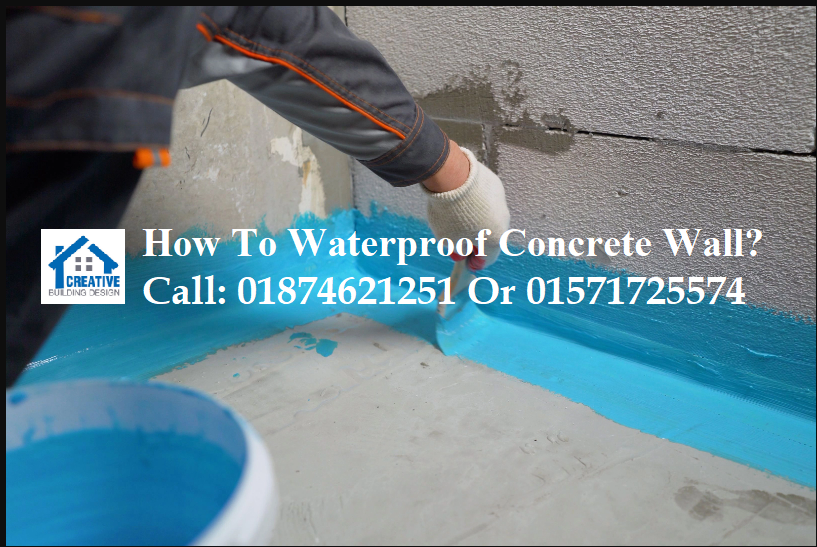
Waterproofing concrete walls is a necessary step to take in order to prevent water damage. There are a few different methods that can be used to waterproof concrete walls, and the best method to use will depend on the specific situation.
One common method of waterproofing concrete walls is to apply a waterproofing sealer. This type of sealer creates a barrier that prevents water from penetrating the concrete. Waterproofing sealers are available in both clear and pigmented formulations, and they can be applied with a brush, roller, or sprayer.
Another option for waterproofing concrete walls is to install a waterproofing membrane. This type of membrane is a thin layer of material that is applied to the surface of the concrete. Waterproofing membranes are available in both sheet and liquid form, and they can be applied with a brush, roller, or sprayer.
yet another common waterproofing method is to install an impermeable barrier. This type of barrier is a layer of material that is placed over the concrete. Impermeable barriers are available in both sheet and liquid form, and they can be applied with a brush, roller, or sprayer.
No matter which waterproofing method is used, it is important to make sure that the concrete is clean and dry before waterproofing is applied. Any dirt, grease, or other contaminants on the surface of the concrete will prevent the waterproofing from bonding properly. Once the concrete is clean and dry, the waterproofing can be applied according to the manufacturer’s instructions.
Contents
- 1 How to make concrete waterproof?
- 2 Is perlite concrete waterproof?
- 3 Why choose perlite concrete?
- 4 Do I need to waterproof concrete floor before tiling?
- 5 What is the Importance waterproof concrete floor before tiling?
- 6 How to waterproof concrete floor before tiling?
- 7 Is drylok concrete floor paint waterproof?
- 8 Final words:
How to make concrete waterproof?
One way to waterproof concrete is to use a sealer. There are many types of sealers available, so be sure to select one that is appropriate for your project. Generally, it is best to use a sealer that is compatible with the type of concrete you are using.
Another way to waterproof concrete is to use a waterproofing membrane. Waterproofing membranes are placed on top of the concrete and act as a barrier to water.
There are many other ways to waterproof concrete, so be sure to do some research to find the best method for your project.
Is perlite concrete waterproof?
Perlite concrete is a lightweight, insulating concrete that is commonly used in construction and gardening applications. While it is not technically waterproof, it is highly resistant to water and moisture. This makes it an ideal choice for applications where water resistance is desired, such as in foundations, walls, and roofs.
Why choose perlite concrete?
There are many reasons to choose perlite concrete over other types of concrete. Some of the most notable benefits include:
- Perlite concrete is much lighter than traditional concrete, making it easier to work with and transport.
- Perlite concrete has excellent insulating properties, making it ideal for use in energy-efficient construction.
- Perlite concrete is highly resistant to water and moisture, making it an ideal choice for wet or moist applications.
- Perlite concrete is fire resistant and does not emit toxic fumes when burned, making it a safer choice for use in fire-prone areas.
If you are looking for lightweight, insulating concrete that is resistant to water and moisture, perlite concrete is an excellent choice.
Do I need to waterproof concrete floor before tiling?
If your concrete floor is in good condition, and you don’t anticipate any water exposure, then you probably don’t need to waterproof it before tiling. However, if you’re not sure, or if you want to err on the side of caution, then it’s probably a good idea to waterproof your concrete floor before tiling.
What is the Importance waterproof concrete floor before tiling?
Waterproofing your concrete floor before tiling is important because it will help to prevent water from seeping through the cracks in the concrete and damaging your tile floor. Water can cause tiles to crack, loosen, or even come completely off the floor, so it’s important to keep it from coming into contact with your tile flooring.
How to waterproof concrete floor before tiling?
There are a few different ways that you can waterproof your concrete floor before tiling. One option is to use a waterproofing sealer, which you can apply to the surface of the concrete. Another option is to use a waterproofing membrane, which you can place over the concrete before tiling.
Which option is best for waterproofing concrete floor before tiling?
The best option for waterproofing your concrete floor before tiling will depend on the condition of your concrete and the level of water exposure that you anticipate. If you’re not sure, or if you want to err on the side of caution, then using a waterproofing membrane is probably the best option.
Is drylok concrete floor paint waterproof?
Drylok concrete floor paint is a waterproof paint that can be used on both interior and exterior concrete surfaces. This product is ideal for garages, basements, and other areas where water and moisture are present. Drylok concrete floor paint is available in a variety of colors and can be applied with a brush, roller, or sprayer. It is a great choice for those who want to protect their concrete floors from water damage.
Final words:
There is no definitive answer to this question as the best way to waterproof concrete walls will vary depending on the specific circumstances and conditions of the wall in question. However, some possible methods for waterproofing concrete walls include applying a waterproof sealer or membrane, installing drainage systems, or using other types of waterproofing products or systems.
Related Post:
- Best Waterproofing & Damp Proofing Company
- Waterproofing And Dampproofing Specialist In Bangladesh
- Acrylic Roof Coating Waterproofing
- Bituminous Membrane in Bangladesh
- Cementitious waterproofing in Bangladesh
- Concrete Waterproofing Company in Bangladesh
- Foundation Waterproofing Membrane In Bangladesh
- How To Make Concrete Roof Waterproof?
- How To Waterproof Basement Concrete Floor?
- Is Concrete Paint Waterproof?
- Polyurea Spray Coating
- Polyurethane Waterproofing In Bangladesh
- Rooftop Waterproofing In Bangladesh
- Waterproofing Chemical in Bangladesh
- Best Waterproofing Applications for Your Flat Roof
- Waterproofing In Bangladesh
- Waterproofing Membrane In Bangladesh
